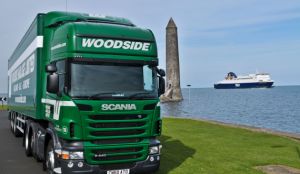Archives
Business, Feature, Freight News, Logistics, Road
Pallet-men gear up for Brexit
[ November 18, 2020 // Chris ]Members of the Pallet-Track network are urgently reminding customers of the new customs protocols for businesses transporting goods between the UK and the island of Ireland after 1 January.
Roche Logistics Group, which has offices in Dublin, Rosslare and Swansea, Northern Ireland’s Woodside Distribution and Letchworth Garden City-based Aztek Logistics, which sends weekly shipments to Ireland, are promoting a Brexit checklist for customers to make sure they are ready for the changes.
Apart from new customs arrangements published by the UK government, businesses dealing with Irish customers must also ensure shipments only travel on heat-treated pallets, as the UK will fall outside of an EU-wide exemption to this rule.
The pallet industry has been in discussions with the government to ensure there are enough heat-treated pallets available.
Damien Roche of Roches Logistics Group, added that businesses moving goods between the island of Ireland and the UK will need to check their Incoterms.
Like Roche Logistics Group, Ballyclare-based Woodside Distribution has also published its own document checklist for all trans-Ireland traffic, in line with the Brexit withdrawal regulations and the Good Friday Agreement.
Northern Ireland will require electronic import entry via the Trader Support Service (TSS) a free-to-use platform via a portal that is not live at this point, but will be essential for all traffic between the UK and the island of Ireland.
To complete this, haulers will need a commercial invoice that includes an EORI number, the exporter and importer’s name and addresses, dates, the gross and net weights as well as value of the shipments and countries of origin.
Northern Ireland also requires a Single Administrative Document (SAD) which will be generated by the TSS process.
Once clearance is completed a Movement Reference Number (MRN) is generated which is lodged with the Goods Vehicle Movement Service (GVMS). All goods vehicles will require a GVMS entry, completed by the haulier, which generates a Goods Movement Reference (GMR) which the driver requires to gain access to a GB port.
Roche added: “We are ready, but businesses are going to see a financial impact for customs clearance which could be as which is likely to impact volumes particularly in the early months of next year.
“They try and work out if the cost of the process – 50 euro for import customs clearance into Ireland and 30 euro for export customs clearance in the UK – will outweigh the value of the consignments.
“This will not be a problem for full loads, but could be for smaller, partial shipments.”
Simon Woodside, managing director of Woodside Distribution, said: “January 1 will bring a new world of regulations and checks for hauliers and their customers so this checklist is an early warning of the protocols we can all expect.
“It’s important that everyone is aware of the necessary paperwork and protocols to minimise any risks of disruption.”
Stuart Charter, managing director of Aztek Logistics, added: “Apart from the new regulations that businesses like ours will face, there is also the need to be aware of the requirement for all pallets to be heat-treated if they are crossing into Europe. We are working hard to make sure our customers are aware of this fact in advance of the end of the year.”

Tags: Pallet-Track; Aztek; Woodside, Roches; Brexit












